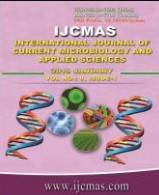


 National Academy of Agricultural Sciences (NAAS)
National Academy of Agricultural Sciences (NAAS)

|
PRINT ISSN : 2319-7692
Online ISSN : 2319-7706 Issues : 12 per year Publisher : Excellent Publishers Email : editorijcmas@gmail.com / submit@ijcmas.com Editor-in-chief: Dr.M.Prakash Index Copernicus ICV 2018: 95.39 NAAS RATING 2020: 5.38 |
Candidiasis has emerged as an alarming opportunistic infection with an increase in a number of patients among the diabetics. It is estimated that as many as 75% of women experience at least one episode of Vulvovaginal Candidiasis during their lifetime. Over the last decade, non-albicans Candida associated with vulvovaginal infections have increased and in recent times have developed resistance to anti‑fungal agents, in particular to the azole compounds. This prospective study was carried out to determine the relative contribution of Candida abicans and non-albicans species in diabetic patients with vulvovaginal candidiasis and their antifungal susceptibility profile. 56 samples collected from diabetic females with symptomatic vulvovaginitis were gram stained and cultured on to Sabourads Dextrose agar and then speciated. Antifungal susceptibility testing of these isolates was done by Kirby-Bauer disk diffusion method. 41.1% of diabetic females had Vulvovaginal candidiasis among which 39.1% were Candida albicans and 61.9% were non-albicans Candida. Among the non-albicans Candida isolates, Candida tropicalis and Candida glabrata were the major isolates. The antifungal susceptibility testing of isolates showed that 39.1% were sensitive, 34.8% were susceptible dose dependent (SSD) and 17.4% were resistant to Fluconazole while most of the isolates were sensitive to Voriconazole and all the isolates were sensitive to Itraconazole. Among 17.4% of Fluconazole resistant isolates, 75% were Candida tropicalis and 25% were Candida albicans. This study shows that the isolation of non-albicans Candida have clinical implications due to their reduced susceptibility to various antifungals, thus highlighting the importance of isolation, species identification and antifungal susceptibility testing prior to initiation of therapy for proper selection of antifungal agent. The judicious use of antifungal agents is very important for the prevention of emergence and spread of drug resistant Candida species.
 |
 |
 |
 |
 |